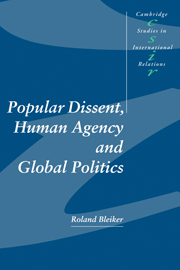Book contents
- Frontmatter
- Contents
- Acknowledgements
- Prologue: Theorising transversal dissent
- Introduction: Writing human agency after the death of God
- Part I A genealogy of popular dissent
- Part II Reading and rereading transversal struggles
- Part III Discursive terrains of dissent
- Conclusion: The transitional contingencies of transversal politics
- Index
- CAMBRIDGE STUDIES IN INTERNATIONAL RELATIONS
Introduction: Writing human agency after the death of God
Published online by Cambridge University Press: 23 October 2009
- Frontmatter
- Contents
- Acknowledgements
- Prologue: Theorising transversal dissent
- Introduction: Writing human agency after the death of God
- Part I A genealogy of popular dissent
- Part II Reading and rereading transversal struggles
- Part III Discursive terrains of dissent
- Conclusion: The transitional contingencies of transversal politics
- Index
- CAMBRIDGE STUDIES IN INTERNATIONAL RELATIONS
Summary
God is dead; but given the way people are, there may still be caves for thousands of years in which his shadow will be shown. – And we – we still have to vanquish his shadow, too.
The concept of human agency occupies a central position in the history of Western thought. From Aristotle onwards countless leading minds have philosophised how people may or may not be able to influence their social environment. Do our actions, intentional or not, bear upon our destiny? Or are we simply creatures of habit, blind followers of cultural and linguistic orders too large and too powerful to be swayed?
Today, the echoes of these questions resonate more than ever. Can there be human agency in an increasingly globalised and transversal world, an epoque of rapid change and blurring boundaries between nations, cultures, knowledges, realities? Who or what shapes the course of social dynamics at a moment when new communicative technologies constantly redefine time, space and the ways in which people relate to each other? Can shifting social designs and their designers be discerned at all?
These are difficult theoretical questions and they must be posed in an investigation that seeks to understand the role of transversal dissent in global politics. Human agency, this book argues, is a concept and a field of inquiry that should be retained despite the existence of a number of serious obstacles.
- Type
- Chapter
- Information
- Popular Dissent, Human Agency and Global Politics , pp. 23 - 50Publisher: Cambridge University PressPrint publication year: 2000

